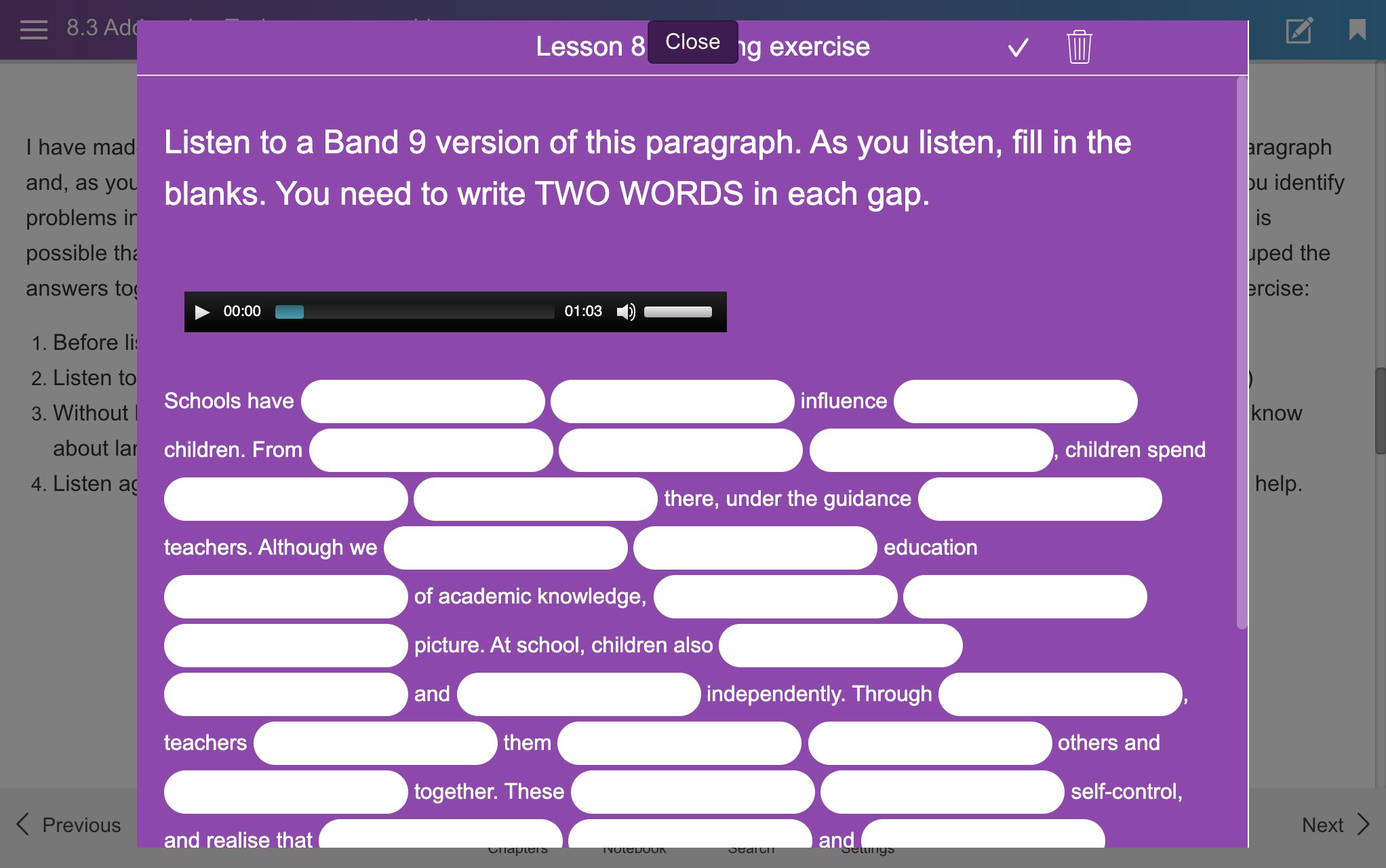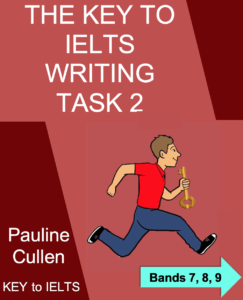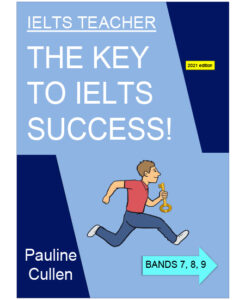Sample answers
I am often asked for sample answers to #IELTS writing task 2 questions. In the past, I believed that these had limited value and I have always been concerned that they encourage people to learn answers to use in the test. I am also worried about providing just one answer when there are multiple possible ways to approach any task. This is why it is important to see the answers supplied in textbooks as a ‘sample’ rather than a ‘model’. The distinction is an important one: a ‘model’ sets a standard that students can learn from, while a sample answer often does not.
Sample answers produced by professional writers also tend to result in a level of English that goes beyond the scope of the test. These answers are written in the comfort of the writer’s home, perhaps in several drafts. If an answer is too long, the writer has time to edit and cut. Before publication, the finished product may also be checked and edited by more professionals, all of which can result in a rather nuanced and subtle response to the task that is closer to a reading passage. In fact, I often think of that level as the invisible band 10 of IELTS.
Understandably, this process does not produce the same results as an individual candidate writing in a timed test situation. Because of this, in my view, the test book sample answers often don’t serve as useful models for candidates or for the classroom. Furthermore, although there are many sample answers online that claim to be band 9, the majority of those I have seen actually show band 6 skills in some criteria. Looking at typical sample answers made me realise that the answers provided as a solution are causing a great deal of the current problems in IELTS writing, and that while there are ‘sample answers,’ good ‘model answers’ are scarce.
Model answers
To address these problems, in The Key to IELTS Writing Task 2, I set out to produce model answers that set the right standard for the test. These models have been produced using a 40-minute time limit so that they reflect what a band 9 candidate can realistically produce in IELTS, and I asked two experienced examiners to assess the level to be sure that they are Band 9.
I was very surprised to learn that I had to change the way I normally plan in order to achieve band 9 Task response and Coherence and cohesion within the strict time limit. Whether I was working on a computer or on paper, if I did not do the right planning, my efforts were problematic in terms of these criteria.
The truth is that teachers and professional writers seldom practise what we preach. As a result, we don’t always appreciate the problems associated with successfully completing the task in exam conditions, and so our advice may not always be practical or effective. This is something I have tried to address throughout this course. I teach you the type of planning I used for my models, and show you my own planning notes. The same advice applies whether you are taking the computer or paper version of the test.
How should I use model answers?
A further problem is illustrated by the following comment I recently received about the sample answers in The Official Cambridge Guide to IELTS:
‘In your Official guide to IELTS, you have provided sample essays. In the essay for test 2, ‘look after’ is repeated three times and ‘than + past simple form’ is repeated 3 times.’
The one clear benefit of a sample answer is that it can show how native speakers write. This benefit is lost if you read a sample answer and critique it using your own ideas of how to write an IELTS essay. Native speakers naturally repeat words and phrases, and, as I show you in the book, so can you.
Repetition is not measured by counting words or phrases, it is something that the reader (and you yourself) can ‘hear’ when you read an essay. It is not at all unusual to find the same word written 3 or more times in an essay, particularly when the word is crucial to the whole topic. For example, if I was writing an essay about hospitals, I would not be at all surprised to have to write that word at least 4 or more times throughout the essay. To put this into perspective, I recently assessed an essay sent to me that used the word ‘language’ 19 times, and half of those where within one paragraph. That is the type of repetition that matters and that is very clear to the reader.
The Key to IELTS Writing Task 2 has 16 model essays at band 9 and shows you how to change a band 6.5 essay into a band 8+ essay. There are listening exercises based on the models as well as other language exercises to help you learn the most from them.
This is a typical listening exercise, where you listen to the recording and fill in the blanks:

Because these exercises are interactive, you can type your answers directly into the spaces and get immediate feedback on whether your answer is right or wrong.
There is a guide in the book showing you how to make the most of the model answers. This includes ideas like these:
- Read the answers several times and focus on something different each time.
- To focus on task response, think about how the writer has made their position clear in the essay.
- To focus on coherence and cohesion, identify the main idea within each paragraph. Think about how this idea is explained, supported, and connected to the question.
- To focus on grammar, look at one paragraph at a time and think about 1) tenses 2) connecting ideas 3) articles 4) relative pronouns
- To focus on vocabulary, notice any words you would never use yourself. If there are none, think about how a native speaker uses vocabulary to talk about this topic. Try to write out 5-10 words and phrases you would like to be able to use. Make a note of how they are used and then try to use them yourself.
- Read the essay aloud – this is often helps you to notice something you may have missed from reading alone.
- Without looking back at the sample, try to write the same answer yourself, in your own words, but practising as many of the words and phrases you noticed as possible.
Buy the Key to IELTS Writing Task 2
Read the grammar and vocabulary chapters of The Key to IELTS Success, as well as the chapters about task 1 and task 2, to learn more about repetition.





Excellent advise
Thank you very much…
I can’t stop reading your posts.they are the best I’ve ever seen.
Dear Pauline,
I hope you doing good. After reading your books(Offical Guide to Ielts and free book) and posts on your website, I have concluded that we should understand the question in order to plan it. Most critical parts are understanding what is the topic of the question and then what is asked in the question.
In your free book on page number 79 you have mentioned
“You must discuss the topic and present an argument that clearly explains your
position on the issues raised in the question”
I am not able to understand what you explain here in this sentence. I guess by “presenting argument on issues raised in the question” you referring to the strategy of answering the question asked- but displaying your opinion as well.
But what you mean by “discussing the topic”
Secondly, I am experiencing extreme difficulty in concluding the task response for advantages out weight disadvantages.
In your book Offical Guide to Ielts in practice test 2 a question is given which is :
One of the consequences of improved medical care is that people are living
longer and life expectancy is increasing.
Do you think the advantages of this development outweigh the disadvantages?
If I have to cover the topic as well as question in one essay, I will
interpret the question in introduction,
then will switch to body one paragraph
where my approach would be Improved medical care has increased life expectancy by inventing body organs transplant.In earlier days liver cirrhosis was fatal now with transplant its a curable disease and person dont have to face death.
In second would state that advantages are more, youngsters have support of their elders for long time.Elders enjoy fruition of their all life hard work.
I know I am not right in this approach but this is what I concluded i should do in order to explain topic of the essay.
Please excuse me for my mistakes.
Sincerely,
Anam
Hi Anam, when I say ‘discuss the topic’ I mean write about the issue in a way that shows all the sides of it (the good and the bad). Presenting an argument means presenting your position (opinion) on the specific question you are given and also explaining why you hold this position.
With the question that asks ‘do the advantages outweigh the disadvantages’ you would be discussing the advantages and then the disadvantages of the issue and then explaining which you think is greater / better and why you think this. Does this help?
Dear Pauline,
Thank you for your kind reply, I wanted to tell you one thing as you’re clearing my ambiguities, I am finding writing task interesting: specifically Task Response. I want to read more questions(authentic) and decide what should be my approach; feels like solving Maths sum. Moreover, want to teach students this concept-though I am not good in English but clearing difficulties has made me feel like helping others :). Thanks a lot for making writing task interesting for me and clearing my doubts.
Alright, so it’s kind of same approach as you have advised in the post of ‘To what extent do you agree or disagree?’
That is: Effects of not having unpaid community service
Advantages of having unpaid community service
Same can be applied for advantages out weight disadvantages.
But explaining which you think is greater / better and why you think this: for explaining what I think is better my language use would convey this(in the body paragraphs), am I right? Moreover, my opinion in conclusion would also explicitly state which I think is better.
But where I should explain: why I think its better or advantageous
In Conclusion, or I need a separate paragraph, or any other way to explicit it that why I think its better.Can you clear this.
Sincerely,
Anam
Your advice is always useful to me!
Thanks. That certainly helps. Waiting for your workbook to release, I will give my next (third) attempt with this new mindset and skills hopefully. Cheers !
Hi Pauline,
It is more of a relief actually to plan and write freely in IELTS than to follow a template. I have two queries:
1) I have noticed that any good piece of writing, including model answers, take their time to set the context first before introducing their main point (I am particularly referring to the Body Paragraphs in IELTS). However, I am personally in a rush to just start off with the central idea of my paragraph in the first sentence, not being articulate in setting the context first because somewhere in my head I have the linear development structure of my argument which follows as [Main Idea>> Support>>> Explain>>> Example/Illustration]. Nowhere in this linear approach can I justify a sentence (or a few sentences) which are merely there to set the context.
2) Reading the Harvard Business Review, ForeignPolicy Magazine or even some good newspapers naturally enriches your collocation, sentence structures, and argumentation. But, when I am writing, I tap into my Writing toolbox in my head and find these structures screaming to produced in my essay. I hate to admit, that I do try to emulate these in my argumentation (My own ideas phrased in the borrowed structure from these best practices of writing). How would you see this? Does the examiner spot this as a template or my style (borrowed)?
Thanks.
Hi Taurus, you raise some very interesting points here. I think that what you’re describing is a transition phase, which is always a struggle and only continual and deliberate practice will help. This is actually a key stage in learning any skill – imagine a sports person who has learned a lot of the basic moves in their sport who then has to learn to be more creative and less rigid with these so that they can advance. In the workbook I am writing now, I am trying o address this by giving you a different voice in your head – my voice! So there will be a lot of listening then writing what you hear involved so that this trains your inner voice to be more accurate and more fluent (I hope!).
With your second point , this is exactly how language learning works and is a great idea – re-dead the chapter on grammar in The Key to IELTS Success where I describe exactly this process and how to make it work for you.
p.s – the examiner will only ‘notice’ this as a negative when it is a template-stye learned language that does not fit the context and appears mechanical as a result.
Dear Pauline,
Hope everything is rosy with you. Here’s some wee points of mine:
1- It might seem weird to you, but I found IdP and British council have been moving towards two different destinations which means their policies in essay writing differ painfully. I just asked one of the IDP’s trainers to score an essay while she didn’t know that the essay was a model essay of Cambridge 7! She did so, and guess what; the score was 6.5!!! The reason: CC & unnecessary sentences. The same story happened when I sent a model answer by IDP to an ex-examiner of British Council where he believed the introduction was poor!!!! Me? Just laughing. And of course wasting some dollars!
2- IELTS is getting more and more complex and confusing! In terms of speaking for example: the band descriptor goes: “use idiomatic language naturally and accurately”. Have u ever happened to know that if the miserable test takers are going to speak naturally it ain’t be accurate any longer! If u know what I mean! Another pain in the neck is the ” less common vocabulary”thing where the examiner’s waiting eagerly to hear some phrases that Shakespeare might have been used once in a blue moon, or else the miserable test taker cannot get more than 7 in Lexical resource whatsoever,
3- and yet hammering the last nail they cannot get more than 7 in other items as well cos the examiner believes -according to what they have been trained on- items mustn’t or let say couldn’t be that different.
4- So let me say what is going on when sb’s taking the test in speaking and writing part: they do not -or better say cannot- think of the very ideas and reasoning u r looking for, rather they think of the aforementioned issues while asking these questions repeatedly in their minds: ” am I penetrating uncommon vocabulary terms properly? O gosh, given that, am I speaking naturally like those native English speakers?! But the last time I was watching BBC they made some grammatical mistakes deliberately, should correct those in me speaking? I mean My speaking! O God I ain’t know what to say: sorry I mean I Don’t know…!!
5- Dear Pauline, to make the long story short, I’d say if ielts is gonna be a good source of money and a money-grubbing thing, well, let it be, but if it’s gonna be a standard way to assess the test takers’ performance, then it will need some serious revision. This is not an exam any longer, seems to me more like taking revenge!
Dear Roger
I will try to address your (numbered) comments here:
1) You seem to have attempted to prove a point about IELTS by pretending you wrote a model answer from a book written more than 10 years ago and asking for feedback on it by current examiners/IELTS teachers. I don’t know the model answer you are referring to, and I don’t know anything about the feedback system you used, but as the score the model was given was the same from both centres, this appears to show that the assessment is working well. The comments you received reflect that the two centres chose to highlight different problems to help you improve, but as the test centres administer the test and do not prepare or write it, it does not show more than this. A test centre cannot ‘decide’ to change their approach to the test in any way and they do not prepare any of the test materials themselves.
2- I can assure you that the examiner is not at all waiting to hear old fashioned Shakespearean English. It does appear as though you have been following bad advice on this?
3- I am afraid I cannot address this next part as I do not know what you mean when you say ‘’and yet hammering the last nail they cannot get more than 7 in other items as well cos the examiner believes -according to what they have been trained on- items mustn’t or let say couldn’t be that different’’.
4- The band descriptor for fluency makes it clear that it is normal and natural to hesitate and correct oneself when speaking naturally. And the band 9 grammar says there may be slips, so, I am not sure why you believe this is not true.
5- It seems clear that you have been following bad advice about vocabulary and perhaps grammar as well and so have not achieved the score you believe you deserve. My free book explains why learning old fashioned idioms will keep you stuck at a lower level, and also explains why many of the common myths about IELTS are incorrect. I really recommend you read it. Here is a link: https://keytoielts.com/product/ielts-teacher-the-key-to-ielts-success/
What about your model answer (p.154) to the Writing Task 1 question in Unit 23 of Vocabulary for IELTS Advanced?
The same pattern is repeated throughout the writing:
1. … are classified as …
2. … is considered to be …
3. … are considered to weigh …
4. … are considered to have …
5. … are considered to be …
6. … are categorised as …
7. … is considered to be …
8. … is mainly restricted to …
I am redoing the writing task answers for all of my books to make them more helpful. Answers like this are written as a sample and not a model. I want to create models that can be used to learn from. I will make the new models available on my website. I agree that the very ‘considered’ is overused here, however, a certain amount of reparation is inevitable in writing tasks like this.
Dear Pauline,
Thank you very much for your valuable explanation.
However, I find sample answers really helpful in many ways, just like 6 points you suggest to use a sample essay. I feel sample answers do not have limited use to language learners as you think.
One example is that reading your sample essays answers a lot of my questions which I have had for a long time, like how it is exactly to give an example or how to write an introduction.
I just would like to share some of my thought.
Sincerely,
Vo Nguyen
Thank you for your comment and for reminding me that I needed to update this post! The views I expressed here where prior to my writing The Key to IELTS Writing Task 2. As I explain in my introduction, I learned a lot about sample answers and model answers when I was researching for the book. If you read the updated post this might help.